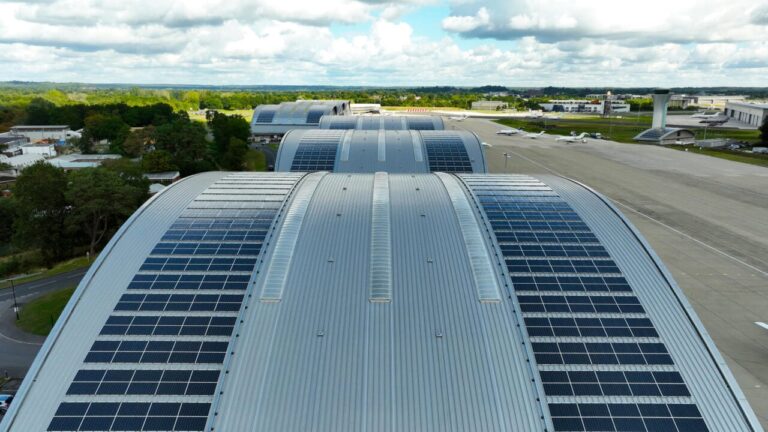Farnborough Airport in Hampshire has completed a £2 million rooftop solar PV project courtesy of solar installer Solvus.
With an installed capacity of 1,700 kWp, the system will be able to generate more than 1.2 GWh of sustainable energy per year and supply up to 25% of the airport’s annual electricity needs.
The installation will also facilitate the airport’s growing fleet of electric vehicles (EVs) by providing green energy. Approximately 75% of annual solar energy generation will be used on-site, while the remaining 25% will be sold back to the energy supplier.
Solvus began building the rooftop solar PV system in January 2024 and has since installed 4,000 lightweight solar panels in hangars one and two, the terminal, the control tower and the Aviator Hampshire hotel at the airport.
Due to their use in an airport, Solvus solar PV modules have reduced glare properties to ensure they do not impact pilot landings.
Solivus CEO Jo Parker-Swift has praised the development of rooftop solar at Farnborough Airport, highlighting that commercial buildings are often limited by structural limitations, while also encouraging other airports to explore rooftop solar .
“We are proud to have worked with Farnborough Airport to ensure the future supply of renewable energy, supporting the airport’s progressive net neutral journey. We encourage other airports to take the opportunity to take advantage of our lightweight solar installations and advance their own sustainability initiative,” said Parker-Swift.
UK airports continue adoption of rooftop solar
UK airports committed to their chosen route to net zero emissions have often explored the use of rooftop solar PV, alongside ground-mounted solar PV, to meet their electricity demand in a cost-effective way.
For example, in 2023, energy supplier SSE Energy Solutions confirmed it would explore developing a “major solar project” at Teesside Airport, with a potential capacity of around 50 MW. This will help achieve the airport’s net zero target by 2030.
The first phase of this project will see up to 3MW of solar energy installed to meet airport and local demand. Once completed, further phases could deliver an additional 50 MW of capacity “over the coming years”.
Solar energy portal has previously reported that solar energy provided London Southend Airport with 25% of its annual energy consumption to reduce its carbon footprint.
In May 2023, Bristol Airport announced that it had started construction on a 2.8 hectare solar PV facility that would help generate at least 16% of the airport’s direct energy needs over the course of the year.


